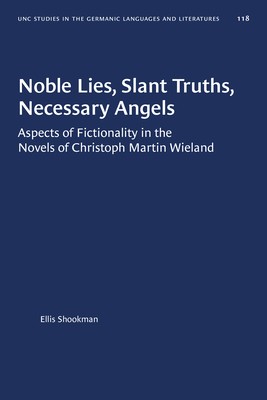
- We will send in 10–14 business days.
- Author: Ellis Shookman
- Publisher: University of North Carolina Press
- Year: 2020
- Pages: 256
- ISBN-10: 1469656493
- ISBN-13: 9781469656496
- Format: 15.2 x 22.9 x 1.5 cm, softcover
- Language: English
- SAVE -10% with code: EXTRA
Reviews
Description
Using the nine novels of Christoph Martin Wieland (1733-1813) as case studies, Shookman explores the notion of fictionality both as a distinctive feature of the stories themselves and as a distinguishing characteristic of the fanciful notions, moral laws, political utopias, religious beliefs, and artistic concepts that they describe. The novels show readers why they should take fictions seriously, yet not literally--or how to suspend disbelief without suspending judgment.
Shookman uses the concepts of imagination, ideals, and illusion to investigate how Wieland's novels define fiction, know its referents, and accept its truths. He places Wieland's use of fictionality in the evolution of the German novel, while also using his work to comment on academic and real world implications of fictionality.
EXTRA 10 % discount with code: EXTRA
The promotion ends in 19d.11:08:11
The discount code is valid when purchasing from 10 €. Discounts do not stack.
- Author: Ellis Shookman
- Publisher: University of North Carolina Press
- Year: 2020
- Pages: 256
- ISBN-10: 1469656493
- ISBN-13: 9781469656496
- Format: 15.2 x 22.9 x 1.5 cm, softcover
- Language: English English
Using the nine novels of Christoph Martin Wieland (1733-1813) as case studies, Shookman explores the notion of fictionality both as a distinctive feature of the stories themselves and as a distinguishing characteristic of the fanciful notions, moral laws, political utopias, religious beliefs, and artistic concepts that they describe. The novels show readers why they should take fictions seriously, yet not literally--or how to suspend disbelief without suspending judgment.
Shookman uses the concepts of imagination, ideals, and illusion to investigate how Wieland's novels define fiction, know its referents, and accept its truths. He places Wieland's use of fictionality in the evolution of the German novel, while also using his work to comment on academic and real world implications of fictionality.


Reviews